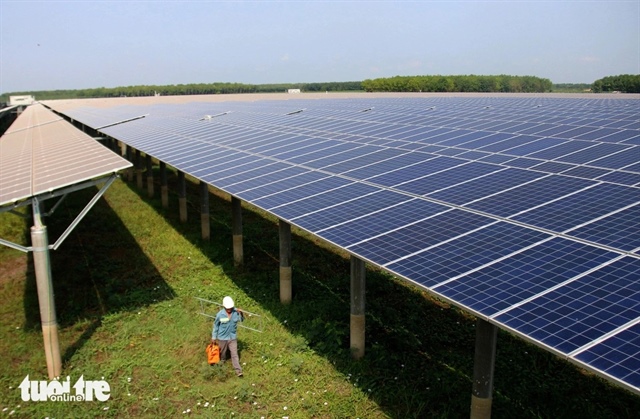
The Ministry of Industry and Trade has declared that it is researching policies to introduce energy storage batteries into Vietnam. Picture: Ngoc Hien / Tuoi Tre |
Pham Dang An, deputy general director of Vu Phong Energy Group, emphasized that BESS is becoming increasingly vital for ensuring energy security and fostering sustainable growth.
He explainedthat the reliable and optimal performance of renewable energy sources heavily depends on effective energy storage systems.
Moreover, developing these devices will relieve pressure on the national power grid and ensure a consistent electricity supply.
Given suchbenefits, An suggestedthat the government establish a comprehensive policy framework that will include financial support and future technical standards to ensure the quality and safety of storage systems.
This would help increase the proportion of storage batteries in Vietnam’s energy infrastructure.
Sunita Dubey, regional lead and Vietnam country representative at the Global Energy Alliance for People and Planet (GEAPP), notedthat Vietnam's share of renewable energy continues to grow.
She encouragedthe incorporation of advanced technologies into Vietnam's energy development and recovery plans.
Dubey highlightedthat major global companies, including Apple, Microsoft, Samsung, Nike, PepsiCo, Procter & Gamble, Nestlé, and Unilever, have been committed to using 100 percentrenewable energy.
This trend underscores the need for Vietnam to evolve its energy strategies accordingly.
Currently, GEAPP is testing a battery energy storage system that integrates with the national grid for the first time, in collaboration with the Asian Development Bank, Rocky Mountain Institute, and the Vietnam Energy Institute (VEI).
The goal is to increase battery capacity to 300 MW and support a financial policy that facilitates the implementation and growth of this pilot BESS project.
Dubey believedintegrating BESS into Vietnam's energy infrastructure presents a promising opportunity for the nation’s energy transformation.
She explainedthat by storing energy during periods of low demand and releasing it during peak times, BESS can enhance the flexibility of the grid system, reduce carbon emissions, and lower electricity costs.
According to data from leading battery suppliers, Dubey pointedout that technological innovations are making BESS more accessible, while the cost of manufacturing lithium batteries has steadily decreased.
She recommendedthat Vietnam seize this opportunity to attract investments, create more 'green'jobs, and improve energy security.
Assessingstorage battery ratio
As policymakers confer on the pivotal role of BESS in advancing renewable energy initiatives and bolstering domestic battery production, collaborative efforts are already underway to seamlessly integrate storage into the nation's electric grid.
The Power Development Plan for the 2021-30 period envisions developments through 2050 (PDP VIII), with Vietnam's Ministry of Industry and Trade aiming to establish a power capacity of 300 MW from BESS by 2030.
The ministry asserted that incorporating storage batteries into the grid wouldensure safe operation and enhance the power system's capacity to absorb renewable energy.
VEIhas been tasked by the ministry with developing this project. The institute will provide technical consultations to review and refine the project, which will be submitted to the prime minister as part of the ongoing revision of PDP VIII.
Deputy Prime Minister Tran Hong Ha has requested that the ministry evaluate proposals for establishing power storage systems to allow for the purchase of 100 percent surplus electricity from rooftop solar energy systems at varying rates and times.
Addressing potential risks
Pham Phuoc Binh, director of Bincon Joint Stock Company, arguedthat integrating solar energy systems with power storage solutions will get ahead of the instability shadowing renewable energy sources, particularly solar power.
Binh explained that fluctuations in renewable energy can disrupt the electricity distribution system managed by state utility EVN, but with an energy storage system in place, many of these issues will be mitigated.
He also statedthat several technological challenges must be addressed to ensure the electricity system operates effectively and investments are made wisely.
For instance, when constructing a solar power system with storage capabilities, an inverter combined with a charging system will be necessary. This system is designed to operate optimally with both solar radiation and the electric grid.
In cases where existing grid-tied solar energy systems are already in operation, addingbattery energy storage systems may incur higher integration costs than new project investments.
Furthermore, it is crucial to determine the appropriate space for backup batteries, especially to ensure fire safety.
The Ministry of Industry and Trade is actively researching policies to incorporate energy storage batteries into Vietnam's energy landscape.
As the country strives to enhance its renewable energy capacity, battery energy storage systems will play a crucial role in ensuring a reliable and sustainable energy future.
By addressing the challenges and leveraging technological advancements, Vietnam can position itself as a leader in the renewable energy sector.
TTN





